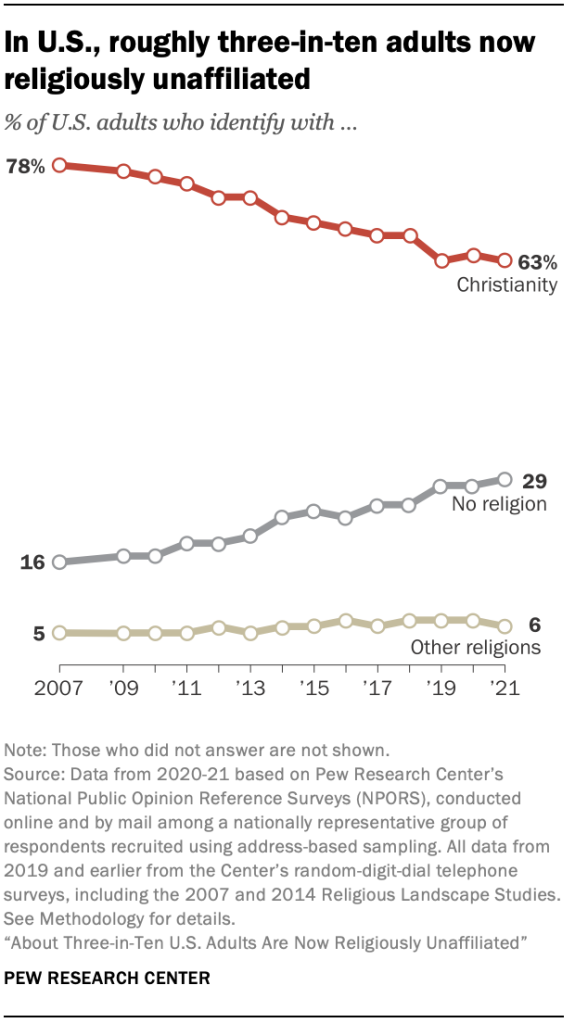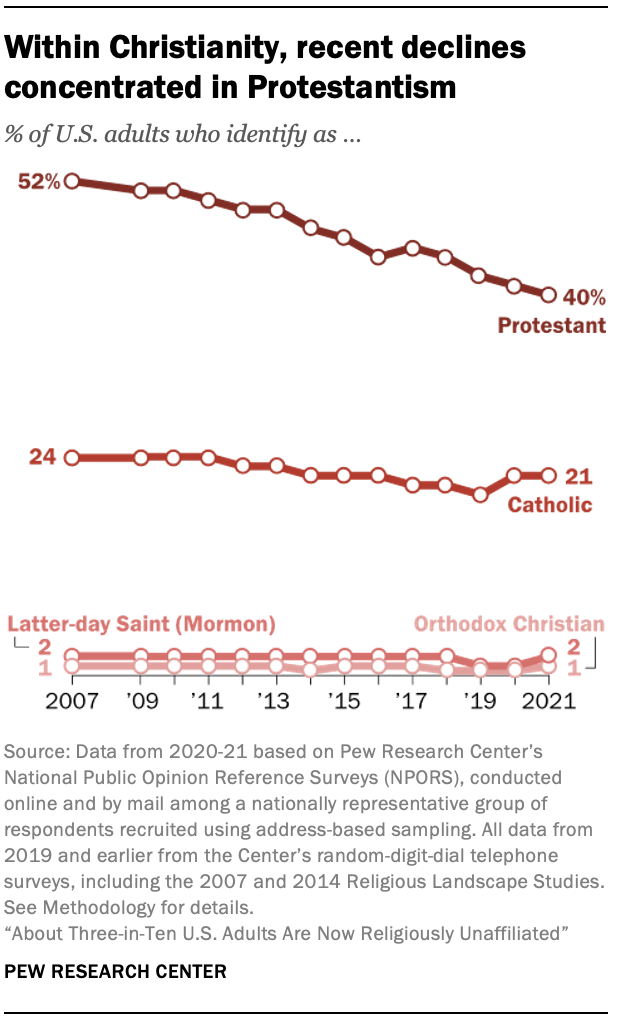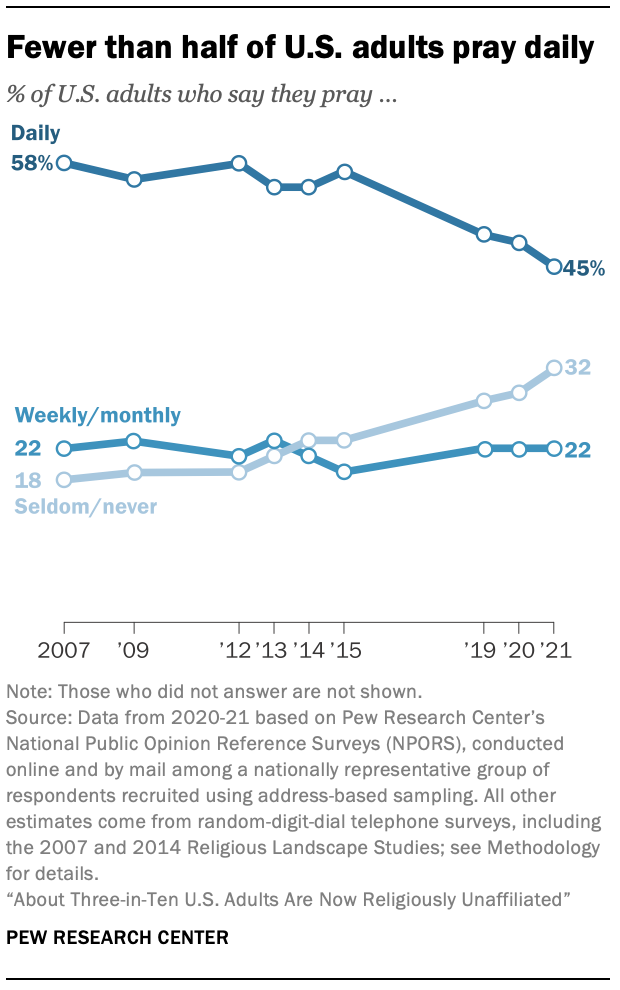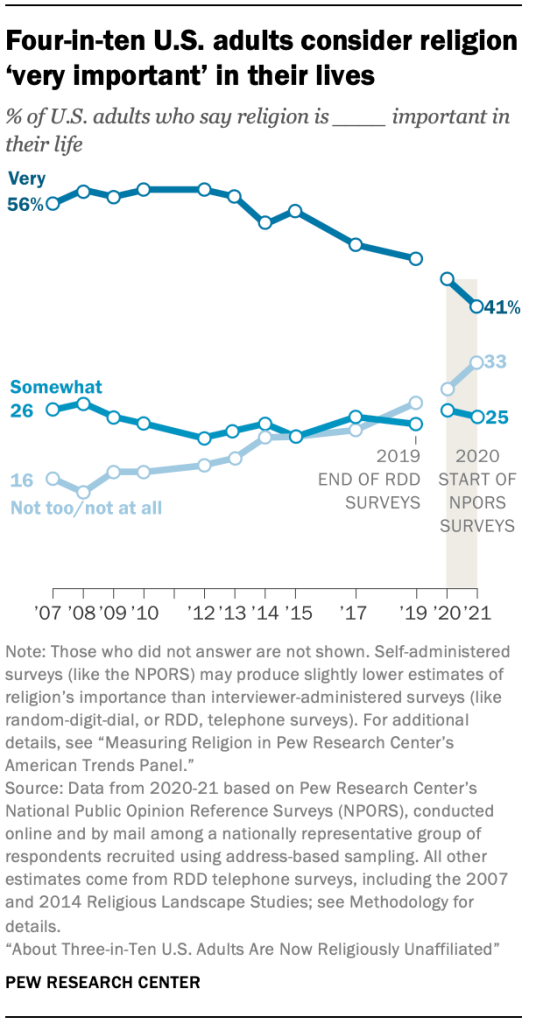The latest Pew Research survey reveals another huge fall in the number of Americans self-identifying as Christian and another increase in the number self-identifying as 'None' or unaffiliated. At just 63% self-identifying as Christians, this is the second lowest since Pew began these surveys, down from 75% a decade ago and from 78% in 2007.
'Nones' have reached a new high at 29%.
As the next chart shows, all the decline has been at the expense of Protestant churches which have fallen by 12 percentage points since 2007 to just 40%, in other words, 6 out of 10 Americans now self-identify as non-Protestant, including 21% Catholic and about 3% Orthodox Christian or Mormon.
The Protestant share of the population is down 4 percentage points over the last five years and has dropped 10 points in 10 years, in other words, these churches which includes those who described themselves as 'just Christian' without identifying any particular church, have been losing about 1% of their share of the people per year.
Catholicism has fallen by only 3 percentage points since 2007 and has staged a small recovery compared to 3 years ago when it fell below 20%. It is now back to its 2014 share at 21%.
Other measures which are normally taken as indicative of religiosity - how often people pray and how important they say religion is in their lives - hold few crumbs of comfort for churches who have seen this massive trend in disaffiliation and loss of congregations (and income).
The percentage of Americans who say they pray daily has fallen from 58% in 2007 to just 45% in 2021. Meanwhile, the percentage of Americans who say they pray seldom or never has risen from 18% to 32%. Almost a third of Americans now pray seldom or never.
The percentage of Americans who told Pew Research the religion was very important in their lives which had remained more or less constant at 57% between 2007 and 2014 when it began a steep decline, now stands at 41%, while over the same period, those saying religion was not important in their lives more than doubled from 16% to 33%.
Other key findings of the survey are:
What is becoming very apparent in these surveys, all of which show a decline in religion and religiosity in the USA, is that America is running about a generation behind Europe in the rejection of religion and the realisation that religions are man-made superstitions based on a primitive understanding of the Universe and a belief in magic; that religion is not needed and is proving to be the major source of conflict in the world. This is, in the longer term, a one-way process as the children of religious parents are more likely to reject religion than are the children of non-religious parent to adopt it. A 2019 survey in the UK showed that in recent times, Christianity has a 'half-life' of about one generation, i.e., half the children of Christian parents will disaffiliate in each generation. Atheism, on the other hand, is growing rapidly as very few children of Atheist parents affiliate with Christian churches but instead gain steadily from the growing proportion of 'Nones' which is acting as a half-way house in the transition from religion to Atheism. There is every reason to think that a similar rate of change will be seen in the USA.
- Roughly three-in-ten adults in the new survey (31%) say they attend religious services at least once or twice a month, including 25% who say they attend at least once a week and 7% who attend once or twice a month. These figures are similar to 2020, when 33% reported attending religious services at least once or twice a month.1 (Unlike the data about religious identity, frequency of prayer and importance of religion, estimates of religious attendance from the NPORS – which is conducted online and on paper – are not comparable with estimates from the Center’s earlier telephone polling. For a detailed analysis of how NPORS results can be compared with data from telephone surveys, see the Center’s January 2021 report “Measuring Religion in Pew Research Center’s American Trends Panel.”)
- More than six-in-ten Black Protestants (63%) say they attend religious services at least once or twice a month, with monthly attendance peaking at 70% among Black evangelical Protestants. Fully 56% of White evangelical Protestants also say they attend religious services at least once a month. Regular religious attendance is much less common among U.S. Catholics (35% of whom say they attend monthly or more often) and White Protestants who are not born-again/evangelical (28%). And frequent religious attendance is almost unheard of among religious “nones,” 97% of whom say they attend a few times a year or less. (Although the NPORS includes respondents from many religious backgrounds, including Jews, Muslims, Hindus, Buddhists and others, the sample did not have enough interviews with members of these religious groups to report separately on their religious practices. However, Pew Research Center has conducted several surveys designed specifically to describe the attributes of these and other relatively small religious communities in the United States; see, for example, “Jewish Americans in 2020” and “U.S. Muslims Concerned About their Place in Society, But Continue to Believe in the American Dream.”)
- Eight-in-ten self-described born-again/evangelical Protestants (79%) say they pray every day, including 76% of White evangelicals and 81% of Black evangelicals. Similarly large shares of born-again/evangelical Protestants say religion is “very important” in their lives. By comparison, far fewer Protestants who are not born-again/evangelical and Catholics say they pray daily and that religion is very important in their lives. Most religious “nones” say they seldom or never pray (71%) and that religion is not too or not at all important in their lives (78%).
- In addition to the 63% of U.S. adults who identify as Christians, the 2021 NPORS finds that 6% of adults identify with non-Christian faiths. This includes 1% who describe themselves as Jewish, 1% who are Muslim, 1% who are Buddhist, 1% who are Hindu and 2% who identify with a wide variety of other faiths. (While 1% of NPORS respondents identify with Judaism as a religion, a larger and more comprehensive Pew Research Center survey of U.S. Jews conducted in 2020 estimates that 1.7% of U.S. adults identify as Jewish by religion.)
- All the subgroups that together make up the religious “nones” have grown over time. In the 2021 NPORS, 4% of respondents describe themselves as atheists (up from 2% in 2011), and 5% describe themselves as agnostics (up from 3% a decade ago). One-in-five U.S. adults (20%) now describe their religion as “nothing in particular,” up from 14% who said this 10 years ago.
The key stage is disaffiliation, so freeing the individual from the peer-pressure of group norms and affiliative needs which enforces conformity with religious beliefs and practices, freeing the individual to look objectively at the evidence for gods and the benefits of religion and finding them absent. As happened in post-war Europe, as more people become openly Atheist, so more people have the courage to come out of the closet and admit their own doubts. Where Atheism is the norm, as in many European countries, so the stigma of Atheism has disappeared. Here, Atheists are now considered to be more trustworthy and more honest with higher levels of personal integrity and social responsibility than religious people, who are regarded now with suspicion. Religion is now seen as an excuse for antisocial attitudes and behaviour and a cloak of pseudo-respectability, hiding something unpleasant, or symptomatic of underlying mental health issues.
What is not shown in this survey is to what extent the abandonment of anything resembling the supposed 'Christian' principles of love, compassion, egalitarianism, marital fidelity and good neighbourliness and the open racism and support for right-wing political extremism, of the white evangelical Christian churches in pursuit of political power and influence during the Trump presidency, has contributed to the accelerating disaffiliation from the Protestant churches.
Another factors which could (and should) have driven decent Americans away from these churches has been their reckless and irresponsible rejection of measures to mitigate the effects of the coronavirus pandemic, and their rejection of any ideas of collective responsibility for the health and welfare of others as an attack on individual liberty, to the extent that these churches became major super-spreaders, with little or no regard for the health and welfare of their fellow Americans, as they celebrated selfishness as a high principle.
It would be astonishing if these recent developments in American fundamentalism were not causing the very many decent Americans to question the religious basis of these repugnant attitudes.






No comments :
Post a Comment
Obscene, threatening or obnoxious messages, preaching, abuse and spam will be removed, as will anything by known Internet trolls and stalkers, by known sock-puppet accounts and anything not connected with the post,
A claim made without evidence can be dismissed without evidence. Remember: your opinion is not an established fact unless corroborated.